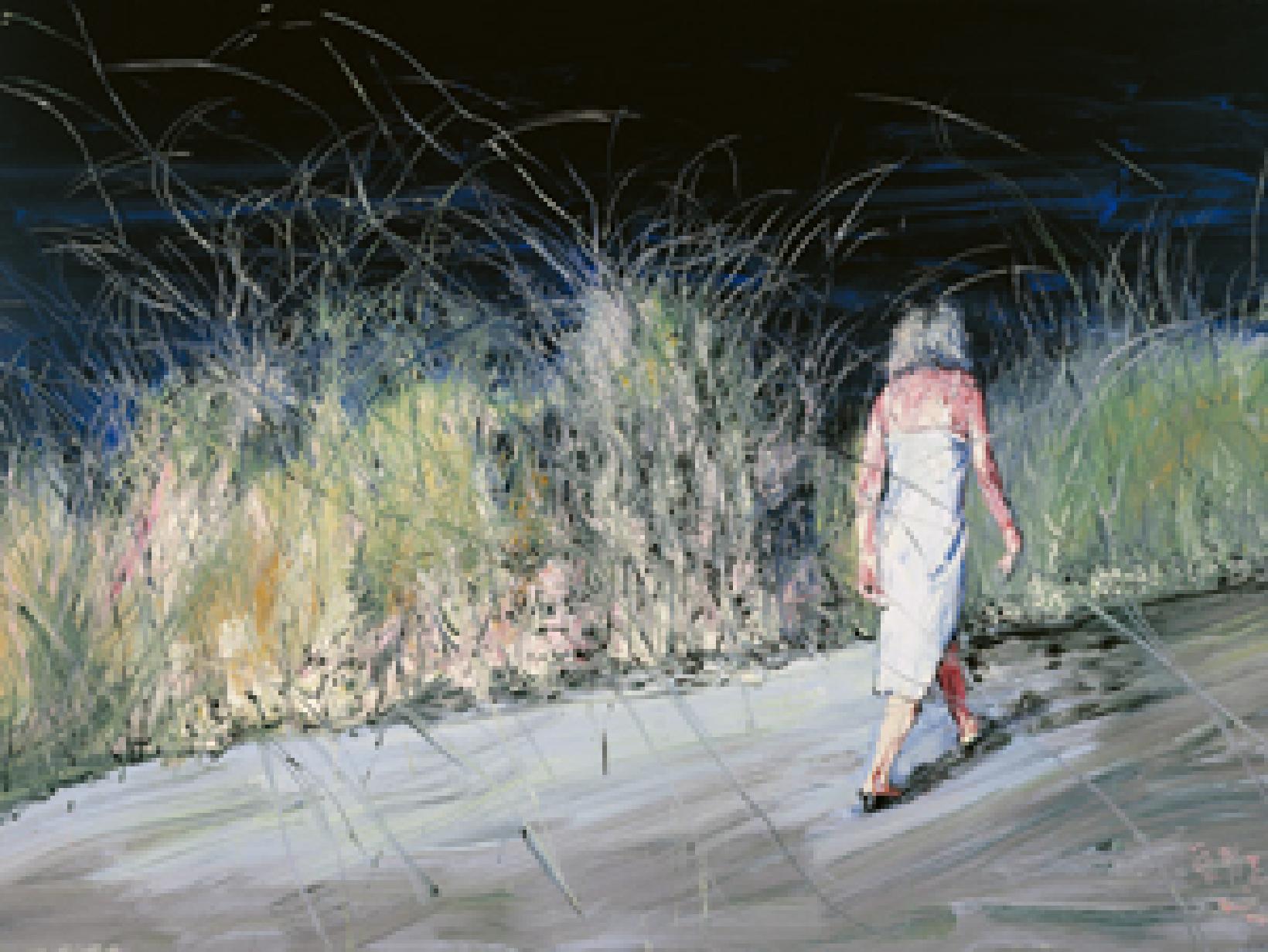Zeng Fanzhi was born in Wuhan, China in 1964 and graduated from the Hubei Institute of Fine Arts in Wuhan in 1991. During his early education in Wuhan, Zeng was highly interested in Western art, philosophy, and the Social Realist techniques of the 1985 New Wave movement in China. Particularly struck by the Modernism, which he witnessed during the 1985 New Wave Movement, he joined the Hubei Institute of Fine Arts.
Such interests resulted in his earliest series of paintings, Meat Series and Hospital Triptychs. Zeng renders human figures with conspicuous outlines, strong brushstrokes, large eyes and hands, exaggerated body portions and other unique characteristics; rather than depicting the figures in a realist manner, the artist highly focused on expressing the figures’ emotions. Zeng’s Meat Series that renders figures as slabs of pink and red flesh, resembling the animal carcasses, also gained critical attention from the art world.
In the wake of rapid modernization and urbanization in China, Zeng began to paint figures in industries around him, such as businessmen and politicians, always wearing masks. These masks represent the disguise of human pain behind the ‘socially acceptable’ or ‘socially expected’ face. Moving to Beijing in 1993, he embodied the hubris, deception, self-satisfaction, solitude emitted by the large city of Beijing into his Mask series. Developing his career, Zeng Fanzhi has continuously sought changes through new works such as Portrait Series and Landscape Series. Such changes are not simply formative ones but they indeed reflect the Chinese society and the artist’s personal life. Constantly facing the political and social upheavals in the 20th century China, Zeng believes an artist must contemplate on the zeitgeist through one’s art.
Zeng lives and works in Beijing, China and has held solo exhibitions at major museums such as Rockbund Art Museum, Shanghai; Fundación Godia, Barcelona; Singapore Art Museum; and Musée d'Art Moderne de Saint-Etienne de Metropole. In addition, he has shown at Saatchi Gallery, London; Musée du Louvre, Paris; Metropolitan Museum of Art, New York; Palazzo Grassi, Venice; and the 53rd Venice Biennale.
쩡 판즈는 1964년 중국 우한에서 출생, 1991년 후베이 인스티튜트 오브 파인 아츠를 졸업했다. 우한에서의 교육과정 내내 쩡 판즈는 서구 예술, 철학에 관심을 보였는데, 특히 1985년 신사조 미술운동이 일어나던 때 처음으로 모더니즘 미술을 접하고 강한 충격을 받아 아마추어 청년화가들의 모임에 작품을 출품하며 입시를 준비하였고, 다음 해 후베이 미술학원 유화과에 입학하였다.
작가가 대학 내내 집중 연구하고 실험한 표현주의적 방식과 관심사를 토대로 초기 작품인 병원 시리즈(Hospital Series)와 고기 시리즈(Meat Series)가 탄생하였다. 쩡 판즈는 인물을 두드러진 윤곽선과 거친 터치, 커다란 눈과 손, 과장된 인체의 비례 등 특정적인 모습을 통해 표현하며, 사실적인 묘사보다는 인물의 심리를 표현하는 데에 중점을 두었다. 사람들의 군상을 마치 고깃덩어리처럼 표현한 고기 시리즈(Meat Series) 역시 미술계의 이목을 집중시켰다.
중국의 급진적인 현대화와 도시화를 겪으며, 쩡 판즈는 그의 주변 산업에 종사하는, 예를 들면 사업가, 정치가와 같은 인물들을 가면을 쓴 모습으로 표현했다. 이러한 가면은 사회가 요구하는 혹은 기대하는 모습 뒤 인간의 고통을 위장하는 도구이자 상징이다. 그는 1993년에는 베이징으로 이주하여 베이징이라는 거대 도시가 내뿜는 허영과 기만, 자기만족, 고독, 이질감 등을 가면 시리즈에 담았다. 그 후에도 쩡판즈는 끊임없는 변화를 추구하며 얼굴 시리즈(Portrait Series)나 풍경 시리즈(Landscape Series)를 선보여왔는데, 놀랍게도 이는 그저 표면적 변화에서 그치지 않고 중국이라는 사회와 작가의 사적인 삶을 반영하며 대중들을 매료시킨다. 꾸준히 정치적, 사회적 변환기를 맞았던 20세기의 중국을 살았던 그는 예술가라면 작품을 통해 사회의 흐름을 반영해야 한다고 얘기한다.
쩡판즈는 현재 베이징에 거주하고 활동하고 있으며, 상하이 록번드 미술관, 바르셀로나 고디아 재단, 싱가포르 현대미술관, 생테티엔 현대미술관 등 세계 주요 미술관에서 개인전을 개최하였다. 그 밖에 런던 사치 갤러리, 파리 루브르 박물관, 뉴욕 메트로폴리탄 미술관, 베니스 팔라초그라씨, 제53회 베니스 비엔날레 등에서도 그의 작품을 선보인 바 있다.
